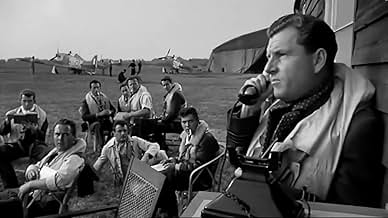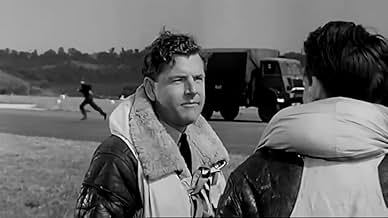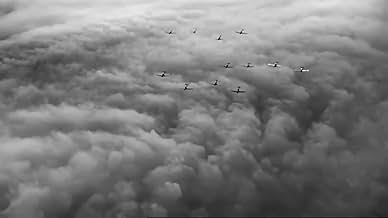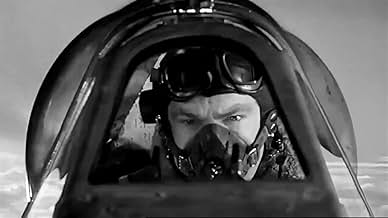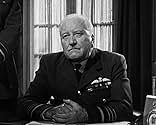CALIFICACIÓN DE IMDb
7.2/10
3.1 k
TU CALIFICACIÓN
Biografía del capitán del Grupo RAF Douglas Bader quien, después de haber perdido ambas piernas, voló un avión de combate británico durante la Segunda Guerra Mundial.Biografía del capitán del Grupo RAF Douglas Bader quien, después de haber perdido ambas piernas, voló un avión de combate británico durante la Segunda Guerra Mundial.Biografía del capitán del Grupo RAF Douglas Bader quien, después de haber perdido ambas piernas, voló un avión de combate británico durante la Segunda Guerra Mundial.
- Dirección
- Guionistas
- Elenco
- Ganó 1 premio BAFTA
- 1 premio ganado y 4 nominaciones en total
Howard Marion-Crawford
- 'Woody' Woodhall
- (as Howard Marion Crawford)
- Dirección
- Guionistas
- Todo el elenco y el equipo
- Producción, taquilla y más en IMDbPro
Opiniones destacadas
It's always encouraging to see the indomitable human spirit gain control against all odds. How easy it would have been for pilot Douglas Bader, played by Kenneth More here, to simply give in to circumstances, drop out of active life, and lead a limited existence all because of a dreadful plane accident in which he lost both legs. But he didn't choose to go that way, and with the advent of WW2 he managed to resume his active pilot career despite the fact of having artificial legs, and had more than a few adventures which he survived. I like this movie for its positive grasp of life and living, and shows that you can create your world if you have singleminded determination. Also of interest were the real life film footage of aerial manoeuvrings used from the war. I'd recommend this war movie any time.
The credits advise that some events and depictions of people/events have been altered for story telling purposes , so this film is not a strictly accurate history of Douglas Bader. Also played down somewhat is Baders arrogance and foolhardiness which lead to his disability in the first place. Still as a inspiration for disabled people and as an almost factual account of Baders life and as film entertainment , it's pretty good. Made reasonably close to the war years it is able to capture the feeling of those years quite well. It is a trifle 'stiff upper lip - what ?' but Kenneth More as usual turns in a good performance. Focusing mainly on Baders attempts, and resulting achievements in war time flying, after a crash means both lower legs have to be amputated. Quite gritty and not too sentimental this offering from director Lewis Gilbert stacks up well against similar films of the time.
The facts of Douglas Bader's life were accurately portrayed in this excellent movie. It is a great movie to watch when you are feeling lousy, and life has got you down. Douglas Bader had an amazing spirit, and lived life to the fullest. Eventhough his lost both of his legs in a flying accident. That did not stop him from becoming a war hero. Who contributed a lot to destroy Nazism, and to preserve our free way of life. I salute Douglas Bader, and this excellent movie about his life.
This may rate as one of the classic war films.
A (fairly) true to life film, about Douglas Bader, who it is reported was a fairly arrogant person, though highly driven.
Kenneth More in the lead role, delivers his usual top notch performance, and they rest of the cast just seem to fit together the way they should.
The film covers Baders life, and the loss of his legs in a flying accident that was in truth of his own making, and then how he puts his life back together afterwards.
It shows an amazing spirit and determination, to the extent that he got back into the RAF and became a successful pilot and air tactition.
This film should be watched by other people who have had the misfortune of an amputation, and i don't mean that in a condescending manner, Bader showed what you can do if you put your mind to it, he wouldn't let his disability beat him.
A really good movie, easily watched more than once, and good for more than one reason.
A (fairly) true to life film, about Douglas Bader, who it is reported was a fairly arrogant person, though highly driven.
Kenneth More in the lead role, delivers his usual top notch performance, and they rest of the cast just seem to fit together the way they should.
The film covers Baders life, and the loss of his legs in a flying accident that was in truth of his own making, and then how he puts his life back together afterwards.
It shows an amazing spirit and determination, to the extent that he got back into the RAF and became a successful pilot and air tactition.
This film should be watched by other people who have had the misfortune of an amputation, and i don't mean that in a condescending manner, Bader showed what you can do if you put your mind to it, he wouldn't let his disability beat him.
A really good movie, easily watched more than once, and good for more than one reason.
I am going to be rather biased in my review of this film as Group Captain Sir Douglas Bader C.B.E., D.S.O, D.F.C is in my opinion, only one step lower than the Almighty himself, on par with Churchill, Wellington and Nelson as one of the greatest Englishmen that ever lived.
Some may argue that he was an arrogant and dogmatic man, and of course in many ways you will be right, but if you had lost both of your legs at the young age of 21 and had to fight every inch of the way just to be treated as an equal rather than a 'cripple', wouldn't you be a bit arrogant too? I know I sure as hell would be.
In those days Englishmen were Englishmen and that meant being forthright and brave, with Bader's situation the way it was, he just had to be a bit more forthright and bit more brave to prove to himself he was not a second rate Englishman, so don't knock him.
He was such a generous and kind man, who worked tirelessly and selflessly, to help people with similar disabilities to his own, especially children.
However his charitable work is not even hinted at in this film, which only covers the period from 1928 when he entered Cranwell R.A.F College, until 1945 and the end of the War.
We see the young Bader excel at sports like Cricket and Rugby and we see him take his first solo flights on his road to becoming not only one of the finest pilots in the R.A.F but one of the foremost aerobatic display pilots in the world.
But we see a dramatic and tragic fall from grace, as on 14th December 1931 Bader stupidly accepts a challenge to perform aerobatics at stupidly low height, and the result is the near fatal crash, which costs Bader both his legs, and the complete destruction of his entire way of life.
We then follow him, through a tough and trying, mental and physical battlefield as he tries to rebuild his shattered life. Bader has to come to terms with each obstacle on his road back to fitness and mobility, and through this film we almost feel as if we are struggling with him, from the first few jerky hops on a 'peg-leg' to the first tottering baby steps on the new state of the art artificial tin legs.
We the audience are so engrossed in his brave fight that we automatically reach out and are ready to catch him as he stumbles.
Once he has returned to full health and after being grounded and 'phased out' by the R.A.F., we follow Douglas into civilian life as he takes on an uninspiring job, his marriage to his beloved wife Thelma, and the pursuit of his new found love of golf, which he feels is a 'sport he can play on equal terms with anyone'
However when the Second World War erupts in 1939, Douglas once again takes up the fight with the R.A.F. in his mission to return to active service.
This time urgency seems to over ride caution and Bader is accepted, and is soon given a command of a squadron, in the run up to the Battle of Britain.
When Bader's own ideas of fighter tactics reach the ears of Fighter Command, he is given latitude to put these ideas in to action, and his squadron is soon joined by two others until eventually Bader was the first person to lead a formation of five squadrons into battle in a tactic known as The Duxford Wing.
However on the 9th August 1941, Bader's Spitfire collided with a Messerschmitt 109 and he was forced to bail out behind enemy lines, and as a result he spent the remainder of the war a P.O.W. in Germany, yet this set back did nothing to curb his British spirit or his dogmatic personality, as he regularly baited, insulted and outwitted the Germans at every occasion, making several escape attempts over the next four years.
The film ends with newly promoted Group Captain Bader, leading the ceremonial Battle of Britain victory fly past over London on 15th September 1945, showing actual footage of the formation, with Bader's Aeroplane flying solo in front.
Paul Brickhill's biography on Bader, on which this film is based, is a must read for anyone who is interested in this extraordinary life, and I thoroughly recommend it, as it goes into the finer detail, a motion picture could not possibly hope to cover.
However, even the book does not give a full biography of the man, as it was printed in 1954, when most of Bader's charitable achievements, the death of his wife, his Knighthood, second marriage and sudden death from heart failure at the age of 72 were still a long way off.
However the plus point of making a bio-pic of a character who was still living, was that Bader was able to have full input into the movie, most notably when it came to the casting of his wife. His exact words on this subject were, 'I'm not going to have some silly tart playing my wife.' But when Bader found out that Muriel Pavlow had been cast he was overjoyed and gave his full approval. Also he became great friends with Kenneth More who portrayed Douglas in the film, in fact the two had become so close he was deeply saddened and affected by More's death which occurred just a few weeks before his own.
However, Kenneth More, is the perfect Bader, Muriel Pavlow is a glamorous and heartfelt Thelma and Lewis Gilbert superbly directs, this story of courage and fortitude, a story of a hero amongst heroes, who despite his appalling disabilities, fights on to become not only a Battle of Britain ace, but an inspiration to millions of people worldwide.
Some may argue that he was an arrogant and dogmatic man, and of course in many ways you will be right, but if you had lost both of your legs at the young age of 21 and had to fight every inch of the way just to be treated as an equal rather than a 'cripple', wouldn't you be a bit arrogant too? I know I sure as hell would be.
In those days Englishmen were Englishmen and that meant being forthright and brave, with Bader's situation the way it was, he just had to be a bit more forthright and bit more brave to prove to himself he was not a second rate Englishman, so don't knock him.
He was such a generous and kind man, who worked tirelessly and selflessly, to help people with similar disabilities to his own, especially children.
However his charitable work is not even hinted at in this film, which only covers the period from 1928 when he entered Cranwell R.A.F College, until 1945 and the end of the War.
We see the young Bader excel at sports like Cricket and Rugby and we see him take his first solo flights on his road to becoming not only one of the finest pilots in the R.A.F but one of the foremost aerobatic display pilots in the world.
But we see a dramatic and tragic fall from grace, as on 14th December 1931 Bader stupidly accepts a challenge to perform aerobatics at stupidly low height, and the result is the near fatal crash, which costs Bader both his legs, and the complete destruction of his entire way of life.
We then follow him, through a tough and trying, mental and physical battlefield as he tries to rebuild his shattered life. Bader has to come to terms with each obstacle on his road back to fitness and mobility, and through this film we almost feel as if we are struggling with him, from the first few jerky hops on a 'peg-leg' to the first tottering baby steps on the new state of the art artificial tin legs.
We the audience are so engrossed in his brave fight that we automatically reach out and are ready to catch him as he stumbles.
Once he has returned to full health and after being grounded and 'phased out' by the R.A.F., we follow Douglas into civilian life as he takes on an uninspiring job, his marriage to his beloved wife Thelma, and the pursuit of his new found love of golf, which he feels is a 'sport he can play on equal terms with anyone'
However when the Second World War erupts in 1939, Douglas once again takes up the fight with the R.A.F. in his mission to return to active service.
This time urgency seems to over ride caution and Bader is accepted, and is soon given a command of a squadron, in the run up to the Battle of Britain.
When Bader's own ideas of fighter tactics reach the ears of Fighter Command, he is given latitude to put these ideas in to action, and his squadron is soon joined by two others until eventually Bader was the first person to lead a formation of five squadrons into battle in a tactic known as The Duxford Wing.
However on the 9th August 1941, Bader's Spitfire collided with a Messerschmitt 109 and he was forced to bail out behind enemy lines, and as a result he spent the remainder of the war a P.O.W. in Germany, yet this set back did nothing to curb his British spirit or his dogmatic personality, as he regularly baited, insulted and outwitted the Germans at every occasion, making several escape attempts over the next four years.
The film ends with newly promoted Group Captain Bader, leading the ceremonial Battle of Britain victory fly past over London on 15th September 1945, showing actual footage of the formation, with Bader's Aeroplane flying solo in front.
Paul Brickhill's biography on Bader, on which this film is based, is a must read for anyone who is interested in this extraordinary life, and I thoroughly recommend it, as it goes into the finer detail, a motion picture could not possibly hope to cover.
However, even the book does not give a full biography of the man, as it was printed in 1954, when most of Bader's charitable achievements, the death of his wife, his Knighthood, second marriage and sudden death from heart failure at the age of 72 were still a long way off.
However the plus point of making a bio-pic of a character who was still living, was that Bader was able to have full input into the movie, most notably when it came to the casting of his wife. His exact words on this subject were, 'I'm not going to have some silly tart playing my wife.' But when Bader found out that Muriel Pavlow had been cast he was overjoyed and gave his full approval. Also he became great friends with Kenneth More who portrayed Douglas in the film, in fact the two had become so close he was deeply saddened and affected by More's death which occurred just a few weeks before his own.
However, Kenneth More, is the perfect Bader, Muriel Pavlow is a glamorous and heartfelt Thelma and Lewis Gilbert superbly directs, this story of courage and fortitude, a story of a hero amongst heroes, who despite his appalling disabilities, fights on to become not only a Battle of Britain ace, but an inspiration to millions of people worldwide.
¿Sabías que…?
- TriviaRichard Burton was the first choice for the lead but he dropped out after he was offered the lead in Alexander the Great (1956) at what Lewis Gilbert describes as "three or four times the salary".
- ErroresWhen Bader is demonstrating his ability to fly the Hurricane to his new squadron of Canadian pilots, there is a long cut of the plane flying upside-down in a straight line. This was impossible in the Hurricane, as it had a gravity-fed carburettor. If you look carefully at the clouds, and how the sunlight reflects from them, the image has clearly been inverted.
- Versiones alternativasOriginally released in Great Britain at 135 minutes; cut by 12 minutes before the American premiere.
Selecciones populares
Inicia sesión para calificar y agrega a la lista de videos para obtener recomendaciones personalizadas
- How long is Reach for the Sky?Con tecnología de Alexa
Detalles
- Fecha de lanzamiento
- País de origen
- Idiomas
- También se conoce como
- Reach for the Sky
- Locaciones de filmación
- Productoras
- Ver más créditos de la compañía en IMDbPro
Taquilla
- Presupuesto
- GBP 380,000 (estimado)
- Tiempo de ejecución2 horas 15 minutos
- Color
- Relación de aspecto
- 1.85 : 1
Contribuir a esta página
Sugiere una edición o agrega el contenido que falta

Principales brechas de datos
By what name was Proa a las nubes (1956) officially released in India in English?
Responda

